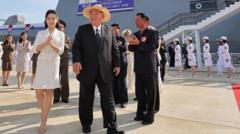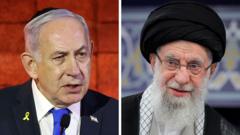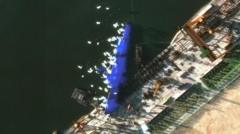The International Atomic Energy Agency has reported that North Korea appears to be constructing a new uranium-enrichment site at its Yongbyon complex, signaling a potential escalation in the country's nuclear capabilities under Kim Jong-un's directives.
North Korea's Potential New Uranium-Enrichment Plant Raises Alarm Among International Observers

North Korea's Potential New Uranium-Enrichment Plant Raises Alarm Among International Observers
Concerns grow as the International Atomic Energy Agency detects signs of a new facility for uranium enrichment in North Korea, prompted by Kim Jong-un's nuclear ambitions.
North Korea seems to be advancing its nuclear weaponry ambitions, as indicated by recent observations from the International Atomic Energy Agency (IAEA). The agency's director, Rafael Grossi, reported that analysts have detected ongoing construction of a new building at the Yongbyon nuclear facility, which bears striking similarities to the existing uranium-enrichment portion of the complex.
Historically, North Korea has operated two primary uranium-enrichment sites—one within Yongbyon, located approximately 62 miles from Pyongyang, and a second site known as Kangson, situated just outside the capital. The construction noted by Grossi suggests that North Korea may be preparing to enhance its nuclear arsenal, a strategy that aligns with Kim Jong-un's public calls for increased nuclear production.
While Grossi did not disclose specific attributes of the new facility, his remarks imply significant advancements in North Korea's capabilities. International scrutiny surrounding North Korea's nuclear ambitions, coupled with new alliances—in particular with Russia—heightens the stakes in prospective negotiations with the U.S. or South Korea, should Kim choose to engage.
The IAEA's ongoing monitoring highlights persistent concerns regarding North Korea's dual production of atomic bomb fuels—plutonium and highly enriched uranium—pointing to a comprehensive strategy aimed at expanding its nuclear stockpile. As geopolitical tensions persist, the implications of these developments continue to alarm international observers, who view North Korea's actions as potentially destabilizing to regional and global security.





















